Picnic and Yoga Mats
Showing all 6 results
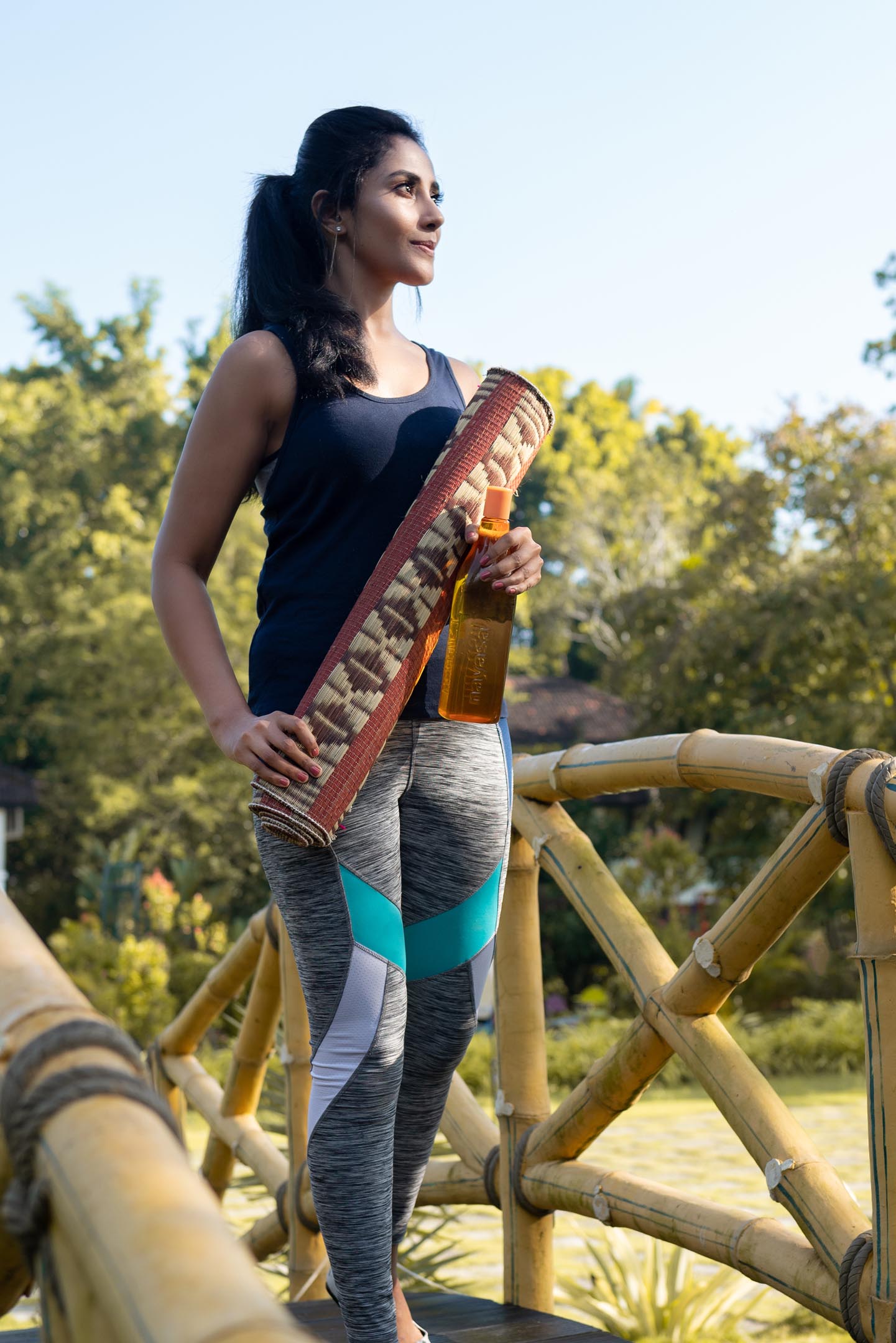
Jaivam Yoga Mat
$60.00
We always look for ways to be environment friendly and use natural materials as much as possible. With this spirit, we experimented with vegetable dyes. And here we are, with a mat dyed using natural colours extracted from the vegetable. Though it takes an additional three days of processing, we feel it is worth the effort. We are confident, very soon, you will feel the same way. Story of Cora Grass and Mat weaving: Cora Grass is found along river banks and in marshy lands. It can grow up to a height of two meters. Family members of mat weavers collect these cora grass and bring it for processing. They cut each grass stem into four strands and remove the soft material at the centre. Before further processing, the grass is dried under the sun, till it develops a beige colour naturally. The grass is then dyed using different colouring materials and processes to match artists imagination. Sometimes, the colouring process takes days, depending on the shade of colour desired. The handcrafted mats are woven using hand operated looms. A set of white yarns as the warp (length) and thin strands of cora grass as weft (width), are woven on a loom hand-operated by weavers. These looms do not use electricity. Human handling lends the mat a unique feel and more value. The resultant mat is softer, more durable and much more comfortable than machine-made mats. The cora grass strands are compacted by hand by the weavers, ensuring sturdiness to the mat. The art of hand weaving is labour intensive and takes a longer time. But, the beauty and quality it adds to the mat is priceless. Choosing handwoven mats supports the rich weaving heritage of Killimangalam and lets the weavers carry on the precious art-form to the future generations as well.
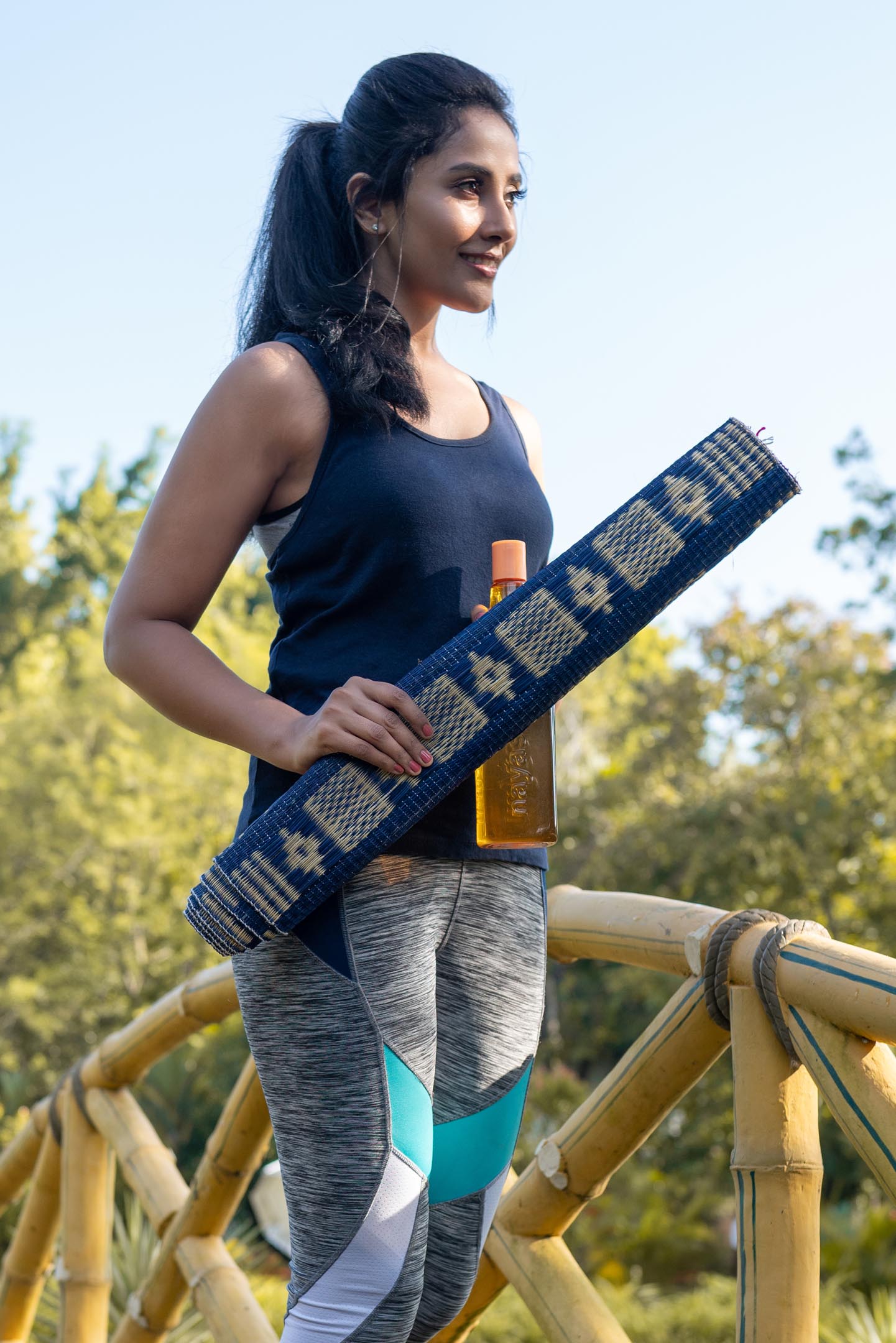
Lalitham Yoga Mat
$55.00
She goes for an early morning yoga session to a park near her home. An easy to carry mat makes her walk to the park breezy. Once she reaches the park, she spreads the mat on any flat surface. She is all ready for a relaxing yoga to energise her body and soul. The early morning sun dries up the mat. After yoga, she rolls her mat and returns home. If there is anything stuck to the mat, she just shows it under running water and put it under the sun to dry. On days when there is a slight drizzle, she blow dries the mat with a hair dryer. She keeps the dry mat in her cupboard and is ready for another busy day at work. Story of Cora Grass and Mat weaving: Cora Grass is found along river banks and in marshy lands. It can grow up to a height of two meters. Family members of mat weavers collect these cora grass and bring it for processing. They cut each grass stem into four strands and remove the soft material at the centre. Before further processing, the grass is dried under the sun, till it develops a beige colour naturally. The grass is then dyed using different colouring materials and processes to match artists imagination. Sometimes, the colouring process takes days, depending on the shade of colour desired. The handcrafted mats are woven using hand operated looms. A set of white yarns as the warp (length) and thin strands of cora grass as weft (width), are woven on a loom hand-operated by weavers. These looms do not use electricity. Human handling lends the mat a unique feel and more value. The resultant mat is softer, more durable and much more comfortable than machine-made mats. The cora grass strands are compacted by hand by the weavers, ensuring sturdiness to the mat. The art of hand weaving is labour intensive and takes a longer time. But, the beauty and quality it adds to the mat is priceless. Choosing handwoven mats supports the rich weaving heritage of Killimangalam and lets the weavers carry on the precious art-form to the future generations as well.
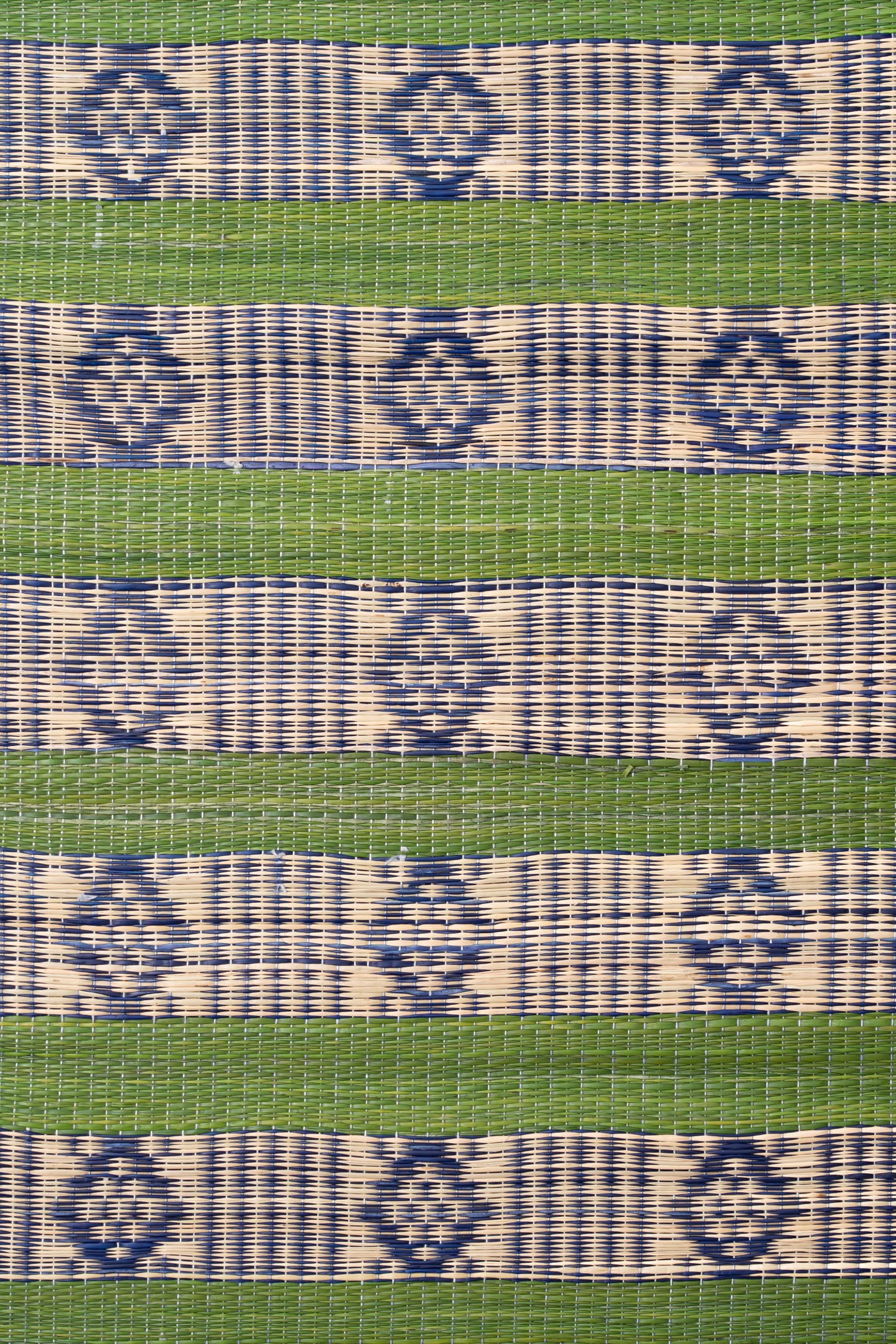
Marathakam Picnic Mat
$65.00
Oh! the bright green emerald (Marathakam) look has such a cooling effect with the green tone on the mat. That soft feeling of a well treated cora grass. Made of all natural materials, you can leave all your worries while you spend time relaxing on it. Have a relaxing outing in the park! Story of Cora Grass and Mat weaving: Cora Grass is found along river banks and in marshy lands. It can grow up to a height of two meters. Family members of mat weavers collect these cora grass and bring it for processing. They cut each grass stem into four strands and remove the soft material at the centre. Before further processing, the grass is dried under the sun, till it develops a beige colour naturally. The grass is then dyed using different colouring materials and processes to match artists imagination. Sometimes, the colouring process takes days, depending on the shade of colour desired. The handcrafted mats are woven using hand operated looms. A set of white yarns as the warp (length) and thin strands of cora grass as weft (width), are woven on a loom hand-operated by weavers. These looms do not use electricity. Human handling lends the mat a unique feel and more value. The resultant mat is softer, more durable and much more comfortable than machine-made mats. The cora grass strands are compacted by hand by the weavers, ensuring sturdiness to the mat. The art of hand weaving is labour intensive and takes a longer time. But, the beauty and quality it adds to the mat is priceless. Choosing handwoven mats supports the rich weaving heritage of Killimangalam and lets the weavers carry on the precious art-form to the future generations as well.
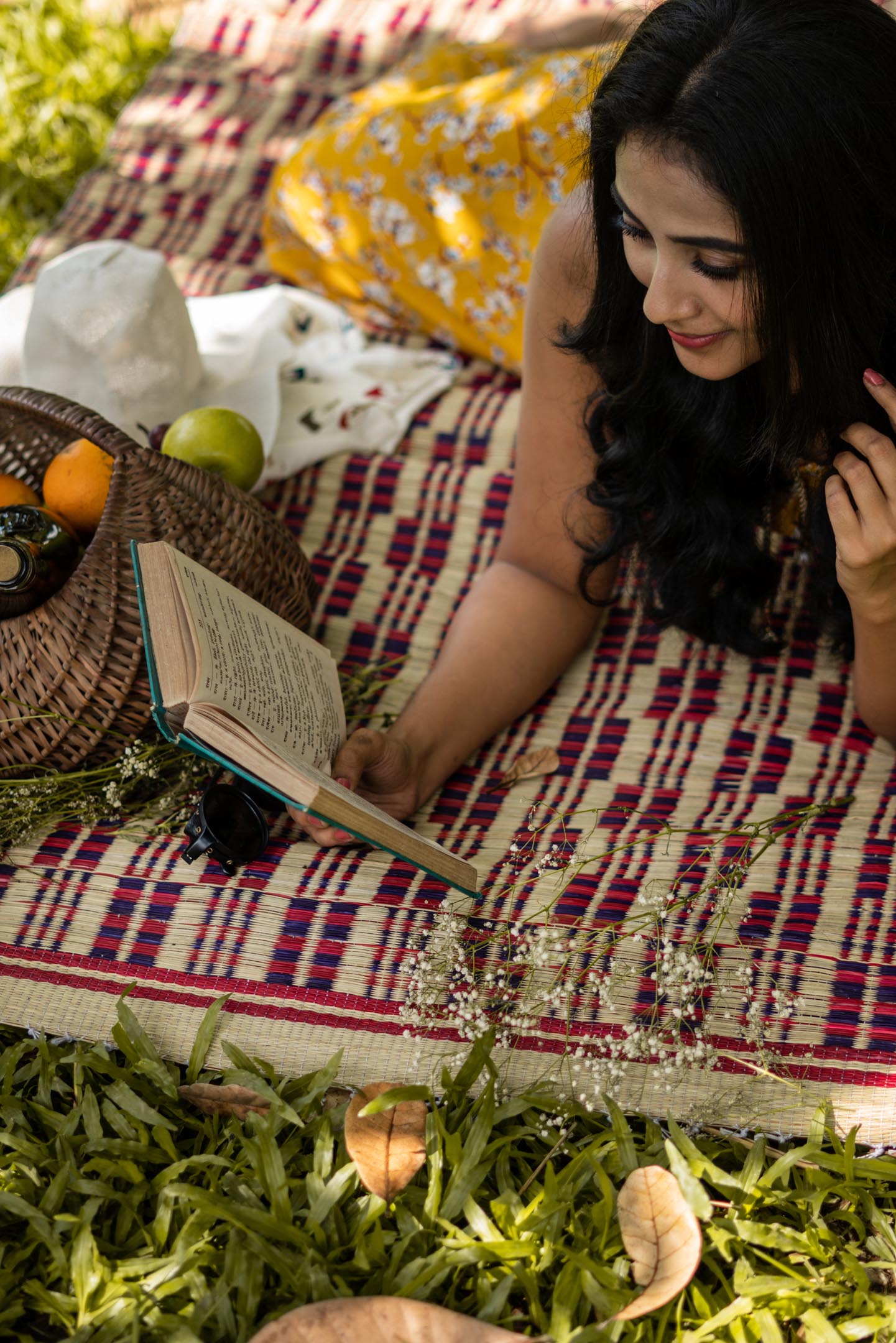
Pavizham Picnic Mat
$65.00
On a soft feeling sturdy mat, with a book in hand and a bright sunny day. What more to wish for a relaxing day... "Pavizham" is the precious coral, which has the distinctive bright pink colour. Here is a precious piece of work from Killimangalam community made out of soft cora grass strands. The bright colours create a warm and pleasant atmosphere. Story of Cora Grass and Mat weaving: Cora Grass is found along river banks and in marshy lands. It can grow up to a height of two meters. Family members of mat weavers collect these cora grass and bring it for processing. They cut each grass stem into four strands and remove the soft material at the centre. Before further processing, the grass is dried under the sun, till it develops a beige colour naturally. The grass is then dyed using different colouring materials and processes to match artists imagination. Sometimes, the colouring process takes days, depending on the shade of colour desired. The handcrafted mats are woven using hand operated looms. A set of white yarns as the warp (length) and thin strands of cora grass as weft (width), are woven on a loom hand-operated by weavers. These looms do not use electricity. Human handling lends the mat a unique feel and more value. The resultant mat is softer, more durable and much more comfortable than machine-made mats. The cora grass strands are compacted by hand by the weavers, ensuring sturdiness to the mat. The art of hand weaving is labour intensive and takes a longer time. But, the beauty and quality it adds to the mat is priceless. Choosing handwoven mats supports the rich weaving heritage of Killimangalam and lets the weavers carry on the precious art-form to the future generations as well.
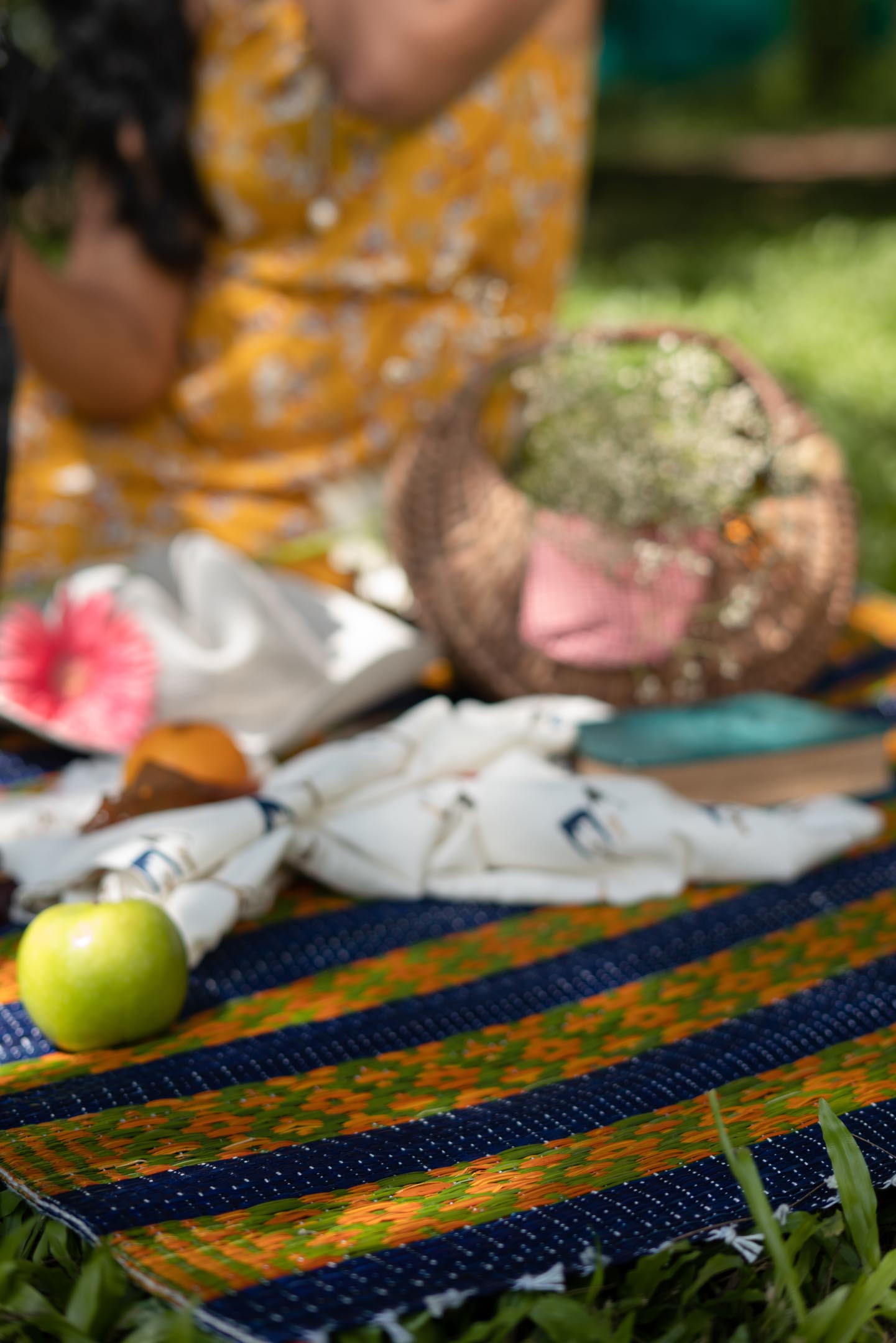
Saantham Picnic Mat
$65.00
A comfortable mat handcrafted by Bindu, Sindhu, Beena and Sheeja, the weavers of Killimangalam. A dash of turmeric sprinkled with beetle nut leaves and bordered with blue. Here is a mat you can have for a relaxing outing. Story of Cora Grass and Mat weaving: Cora Grass is found along river banks and in marshy lands. It can grow up to a height of two meters. Family members of mat weavers collect these cora grass and bring it for processing. They cut each grass stem into four strands and remove the soft material at the centre. Before further processing, the grass is dried under the sun, till it develops a beige colour naturally. The grass is then dyed using different colouring materials and processes to match artists imagination. Sometimes, the colouring process takes days, depending on the shade of colour desired. The handcrafted mats are woven using hand operated looms. A set of white yarns as the warp (length) and thin strands of cora grass as weft (width), are woven on a loom hand-operated by weavers. These looms do not use electricity. Human handling lends the mat a unique feel and more value. The resultant mat is softer, more durable and much more comfortable than machine-made mats. The cora grass strands are compacted by hand by the weavers, ensuring sturdiness to the mat. The art of hand weaving is labour intensive and takes a longer time. But, the beauty and quality it adds to the mat is priceless. Choosing handwoven mats supports the rich weaving heritage of Killimangalam and lets the weavers carry on the precious art-form to the future generations as well.
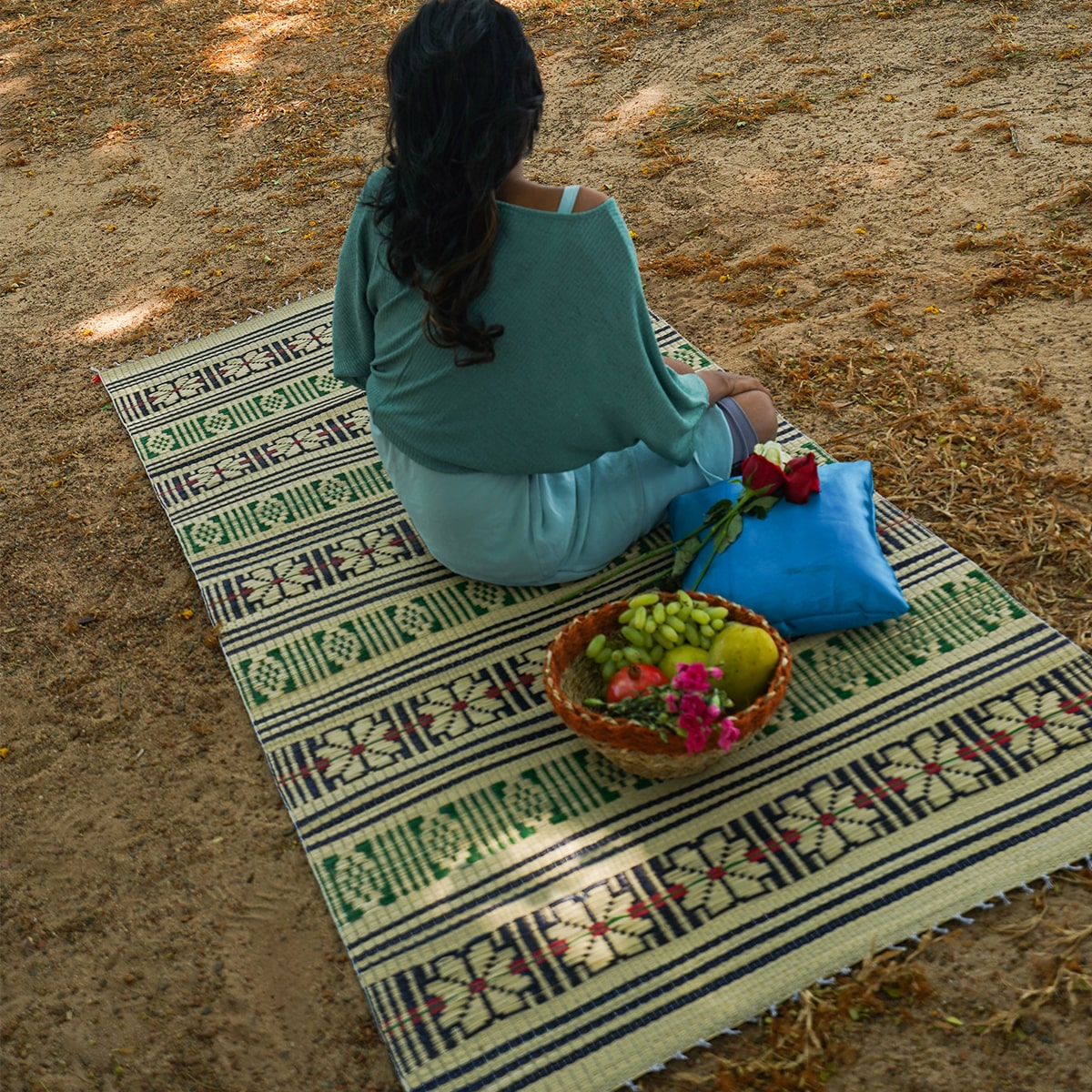
Shobha Picnic Mat
$65.00
The unique design adds "Shobha" (brilliance and charm) to the mat. Spread this outdoors and rest on it for a relaxed outing. Get noticed by the unique design of the mat! Story of Cora Grass and Mat weaving: Cora Grass is found along river banks and in marshy lands. It can grow up to a height of two meters. Family members of mat weavers collect these cora grass and bring it for processing. They cut each grass stem into four strands and remove the soft material at the centre. Before further processing, the grass is dried under the sun, till it develops a beige colour naturally. The grass is then dyed using different colouring materials and processes to match artists imagination. Sometimes, the colouring process takes days, depending on the shade of colour desired. The handcrafted mats are woven using hand operated looms. A set of white yarns as the warp (length) and thin strands of cora grass as weft (width), are woven on a loom hand-operated by weavers. These looms do not use electricity. Human handling lends the mat a unique feel and more value. The resultant mat is softer, more durable and much more comfortable than machine-made mats. The cora grass strands are compacted by hand by the weavers, ensuring sturdiness to the mat. The art of hand weaving is labour intensive and takes a longer time. But, the beauty and quality it adds to the mat is priceless.
Showing all 6 results
Related products
View all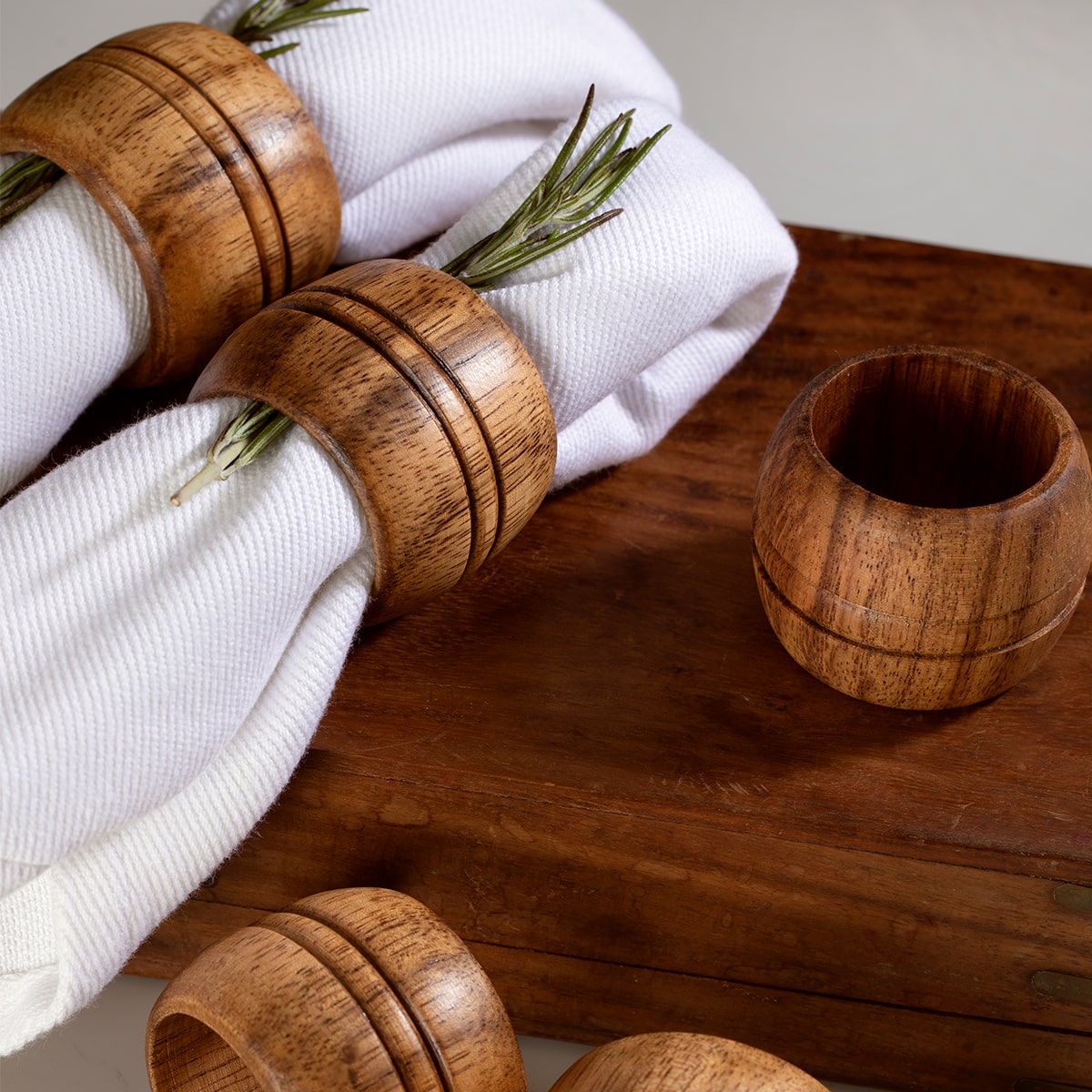
Wooden Napkin Ring – Set of 6
$1500
$1500
Finely carved out of hard Teak wood, these napkin rings will surely add a rustic charm to your table decor Wood Craft: We use good quality Mango wood and teak to make the products. Traditional carpenters use hand operated tools to carve the products out of large wood logs. It is hand finished to make it smooth
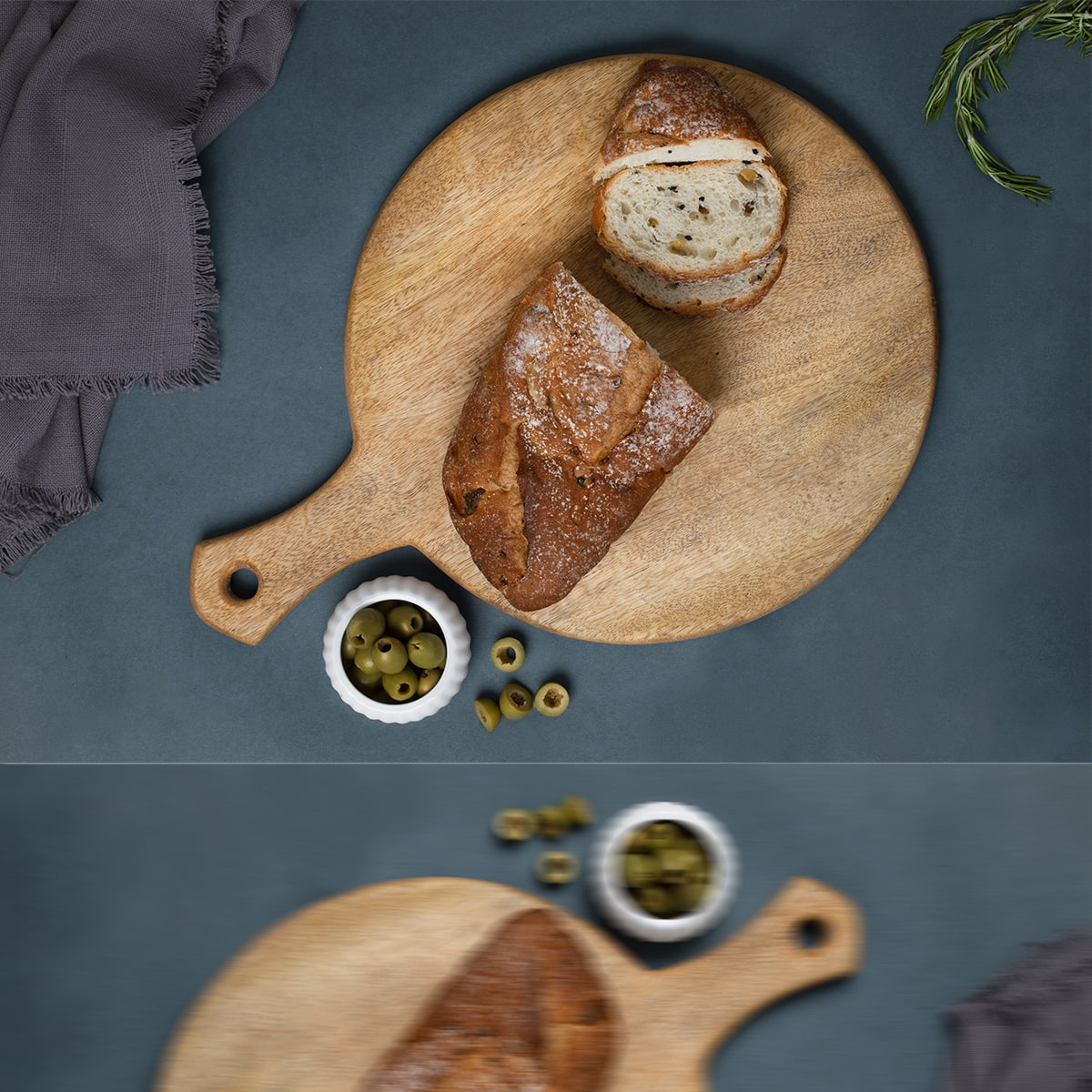
Thattam Wooden Serving Platter
$1450
$1450
Wood Craft: We use good quality Mango wood and teak to make the products. Traditional carpenters use hand operated tools to carve the products out of large wood logs. It is hand finished to make it smooth
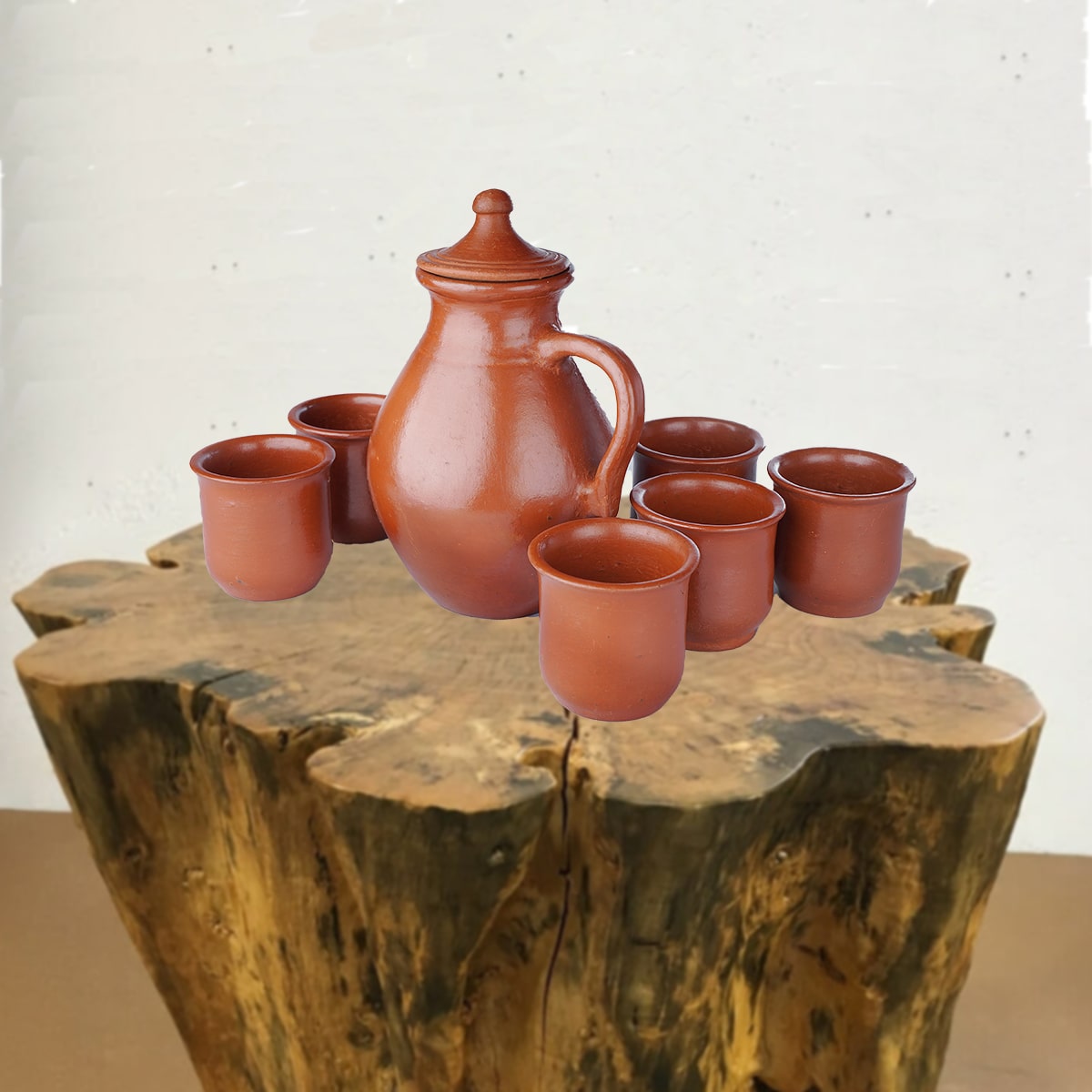
Kooja – Coppa – Set of Jug + Six Cups
$2750
$3000
In Kerala, during good old days, one of the first activity in the morning during summer is to fill a "kooja" (an earthen pot) with water. The kooja perspires and cools the water and it quenches the thirst of everyone in the household with cool water. In olden days, people used to drink water from Kooja using a small bowl called "coppa" or "pinjanam". Here is an attempt to recreate the way of serving some naturally cooled water. It is a "Kooja and coppa" set